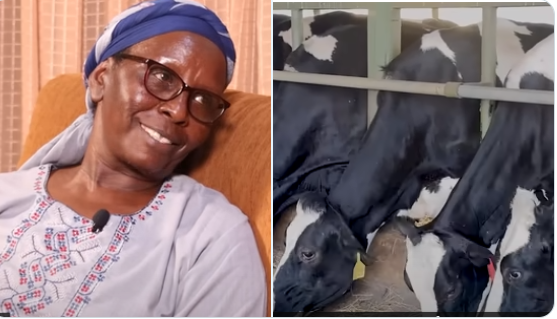Ann Wakili Mwangi’s journey from a rural primary school to the helm of Meved Dairy Farm is an inspiring saga of perseverance and dedication.
It all began in 1986 when Ann and her husband acquired a modest 5-acre plot of land. Their initial foray into farming, focusing on maize, was met with disappointment as unpredictable weather patterns wreaked havoc on their crops. Despite this setback, their determination remained unshaken.
The turning point came in 2000 when they decided to give farming another shot. This time, their efforts bore fruit, leading to a bountiful harvest that renewed their optimism and faith in the agricultural path they had chosen.
Buoyed by this success, Ann and her husband expanded their horizons, venturing into animal farming in 2007 with the introduction of a Zebu cow. Witnessing a scarcity of milk in their locality, they later incorporated hybrid cows into their farm, kickstarting their dairy production.
However, their journey was far from smooth. In the wake of the 2007/2008 post-election violence, they faced numerous challenges.
Undeterred, they acquired six Fresian cows, which, within six months, transformed their farm into a hub of milk production. The demand for their high-quality milk surged, prompting them to invest in storage solutions like coolers to accommodate the surplus.
Over time, they established a solid market for their milk, securing contracts with processors and cementing their place in the industry.
Meved Dairy Farm’s success story doesn’t end here. Despite facing adversities like droughts that reduced their dairy herd to 120 cows, Ann’s entrepreneurial spirit persevered.
She diversified her operations by venturing into poultry farming, housing an impressive 10,000 chickens that churn out a substantial quantity of eggs daily.
This diversification not only bolstered their income but also provided a strategic buffer during times of scarcity, ensuring the sustainability of their farm.
To bolster their self-sufficiency, Ann and her team dedicated 80 acres of their land to cultivating essential animal feeds, such as sorghum and maize.
This approach not only ensured optimal nutrition for their livestock but also shielded them from the impact of external factors on their operations.
Despite the challenges posed by high electricity costs, they continued to power through, innovating and adapting to sustain their thriving farm.

